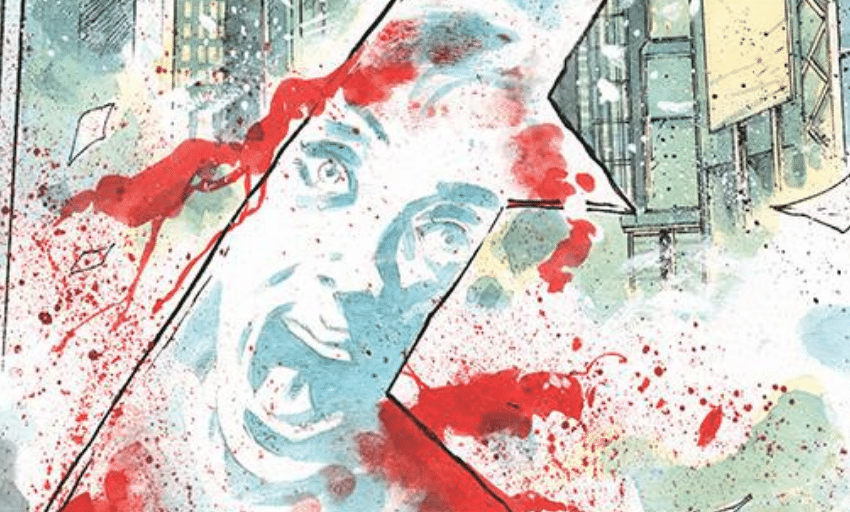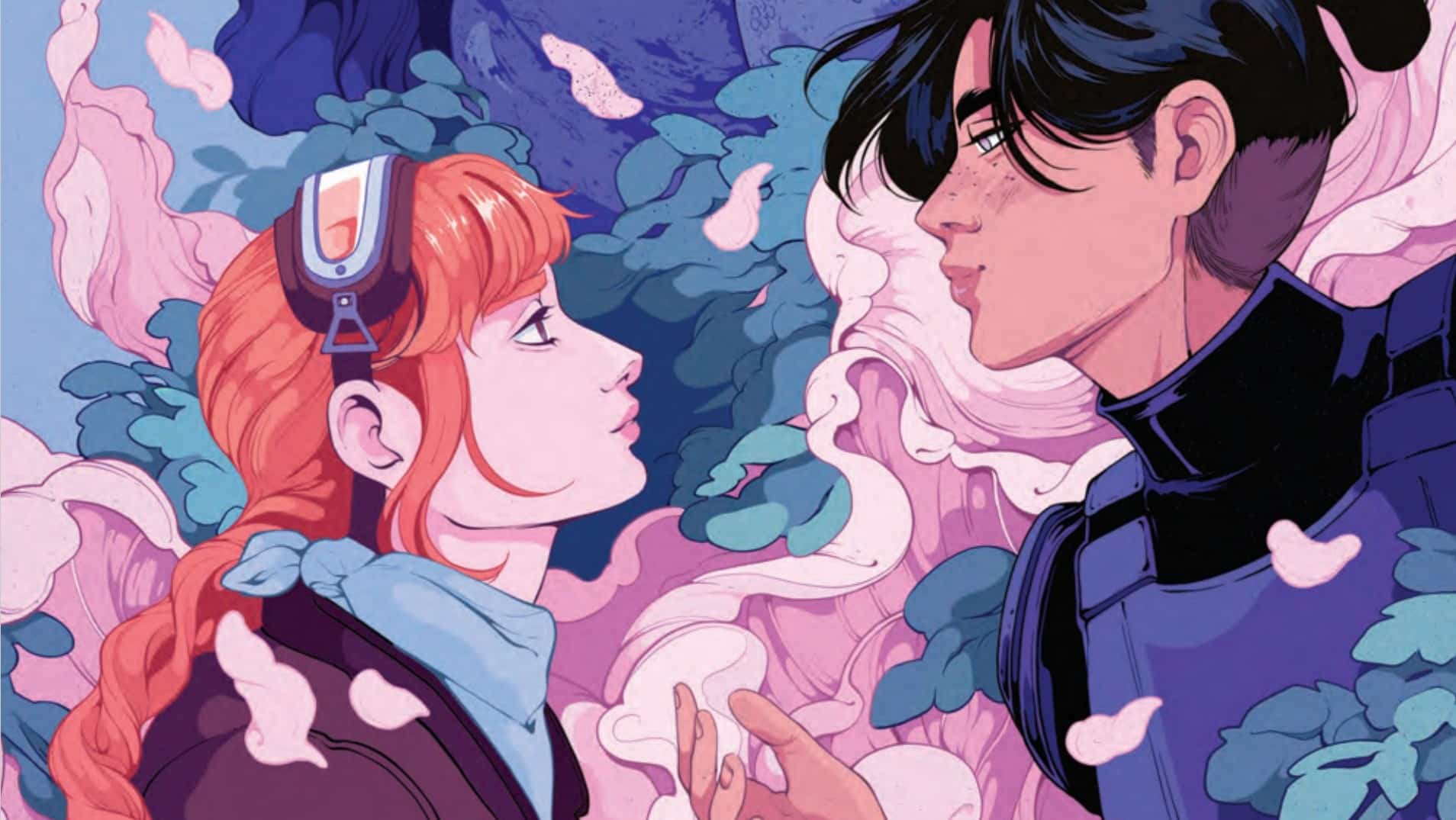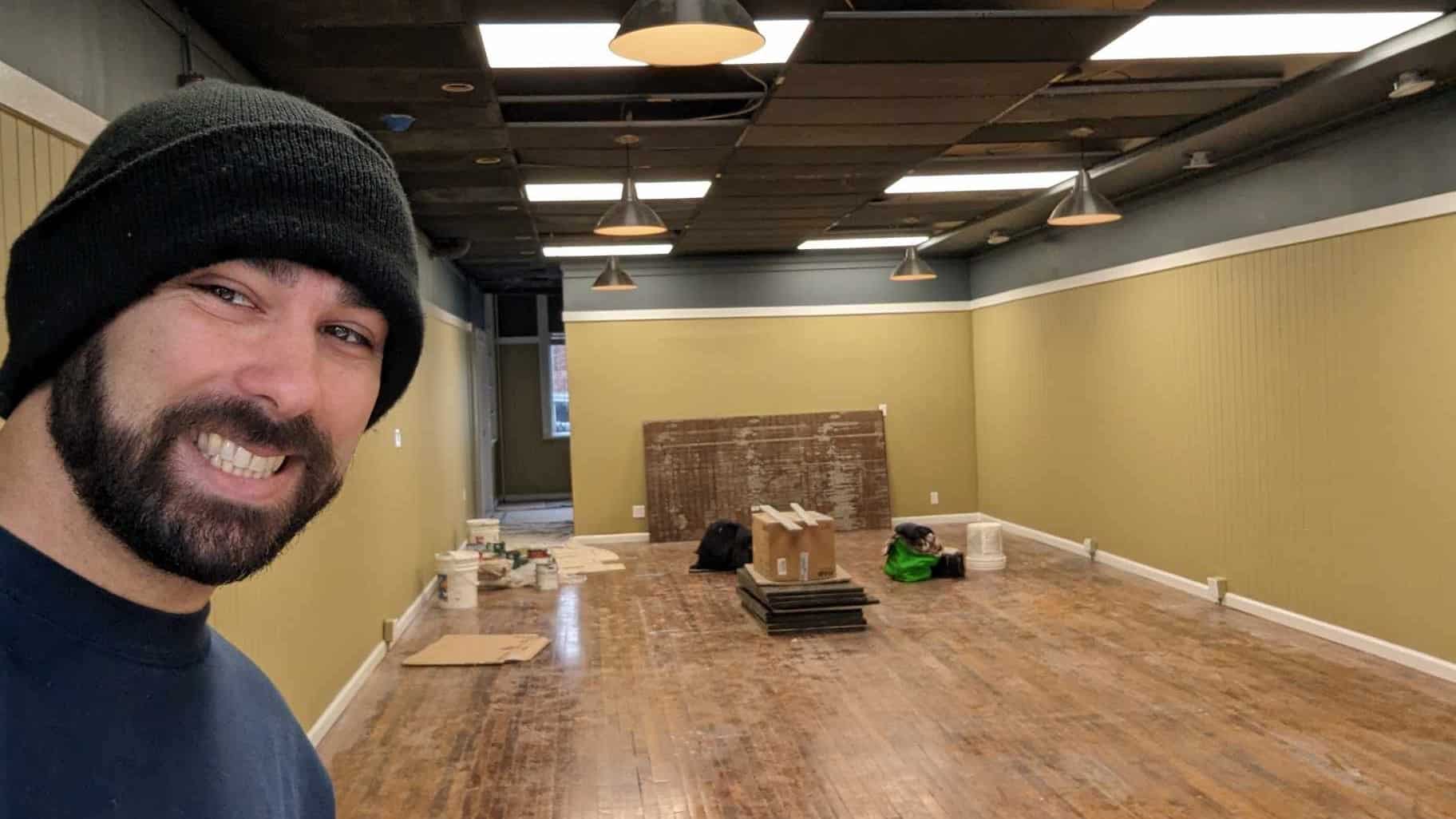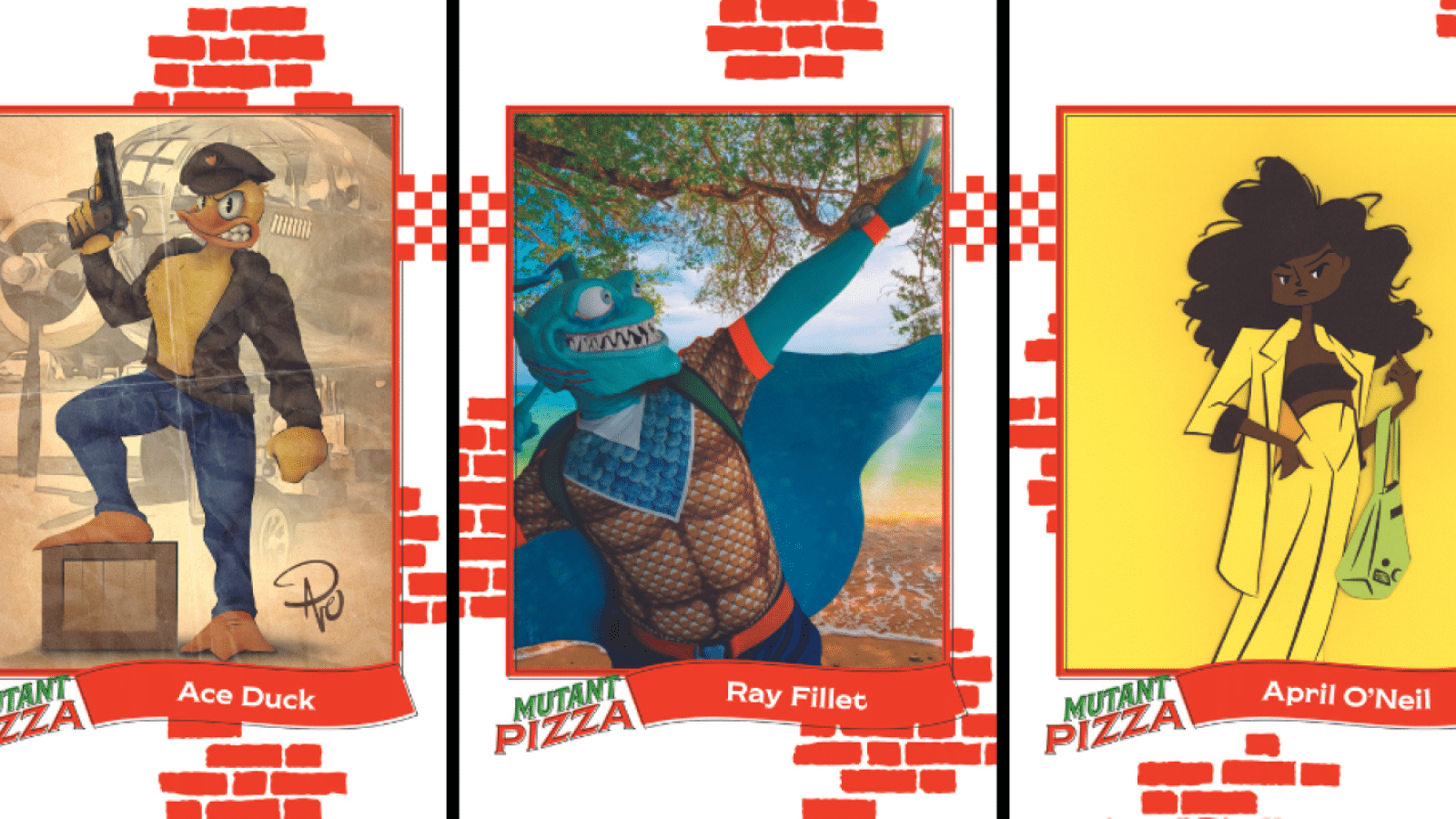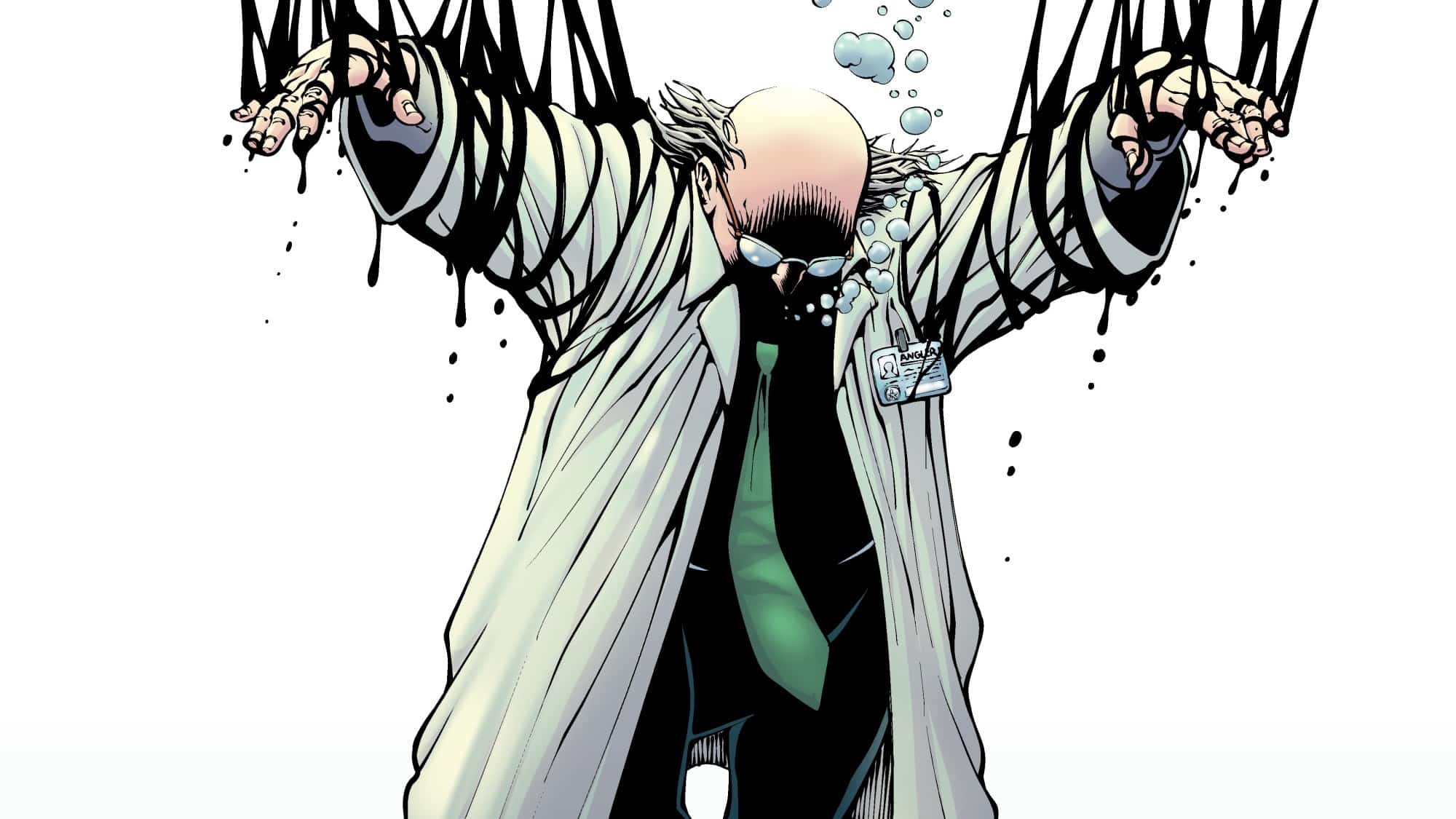Maniac of New York, the new AfterShock series from writer Elliott Kalan, artist Andrea Mutti and letterer Taylor Esposito, begins with a simple idea: A big, tough Jason Voorhees-type abomination climbs out of the camp swamps and heads to the big city to kill a lot of people. And that would be a fun slasher book if it stopped there. But the profound thing — the damnedable, disturbing thing — is that the Maniac sticks around. He becomes a fixture in New York, like Spike Lee sitting courtside at the Knicks, The Judge’s Chambers at Yankee Stadium or the Jets’ permanent status as a doormat. The city, rather than mustering the will or the resources to stop him, simply adapts, which really means it ignores him as he continues to kill.
What started as a book speaking to gun control, Kalan says, has become a book about the coronavirus — how it’s been ignored or marginalized and efforts to mitigate it scorned, all while the sick and dying continue to suffer. I talked to Kalan via email about the series, its future and its origins, his views on satire as informed by a stint as the head writer on The Daily Show and his recent appearance on Jeopardy! that ended with an unfortunate bit of bad luck.

Let’s start with some of your most recent news — a Jan. 25 appearance on Jeopardy!. How was that experience? Does Ken Jennings smell nice? And pulling World Geography for Final Jeopardy? I think I would have cried.
Being on Jeopardy! was really fun. It was a lifelong dream of mine. I’ve been watching the show since I was a kid. Everyone there was really nice. Obviously I would have liked to have won the game, but that wasn’t in the cards. Ken Jennings was very nice, but we all had to stand so far away from each other due to COVID protocols that I couldn’t really smell him. To be honest, I did get irritated that World Geography (my worst subject) was the Final. But the only thing I found really galling was not getting to answer the Daily Double about Fiddler on the Roof, a musical I watch multiple times a year during the High Holidays. But overall, I give being on Jeopardy! my highest recommendation.
[Will’s note: The Final Jeopardy clue was “Of the countries bordering the Mediterranean Sea, these two on opposite sides of it are the smallest & largest in area.” The correct response: What are Algeria and Monaco? If you knew that, you’re probably not the sort of person I can deal with. That Fiddler clue? “With its focus on ‘Tradition’ & families, this musical has been one of the most popular in Japan since its 1967 premiere there.”]
You’ve been in comics for a bit, (more on that in a second) but I think this is your first creator-owned series. How are you liking that so far? What’s it been like working with Andrea Mutti, Taylor Esposito and the rest of the team behind you?
This is the first time I’ve put out a creator-owned comic through a real publisher. My podcast, The Flop House, dabbled with putting out creator-owned webcomics to raise money for charity a few years ago — but that was a different kind of animal. It’s been really freeing to write a series where I don’t have to worry about pre-existing continuity or what plans the publisher might have for the characters I want to use. Andrea and Taylor have been really fantastic to work with, and everyone at AfterShock has been super supportive and let me do basically what I want with it. I’m part of a really cohesive team, which is the best feeling. The story you see on the pages is very much the story I’ve wanted to tell all these years, and I’m thankful for that.

You’re the writer behind Spider-Man and the X-Men and Sauron’s wonderfully blunt “But I don’t want to cure cancer. I want to turn people into dinosaurs,” which was such a great framing of the inherent weirdness of comics and why these rogues are never going to leave the gallery. I’m guessing you had no idea that was going to get over so big — what was it like to watch that become a meme?
Well, think about it, why would a pteranodon-man care about curing cancer? He has his own priorities! That’s a funny panel, because when I wrote it I knew that I found it funny, but I couldn’t quite explain why I found it funny. It was really gratifying to see other people latch onto it, because it justified to me that I can trust my gut. I’ve loved seeing it take on a life of its own and become a meme people use a shorthand to go after selfish billionaires, which is pretty close to the meaning of the panel in-context. Is it slightly weird that far, far more people have seen the meme than ever read the actual book? Sure, but that’s life.
Now, on to Maniac of New York. Going by some of your earliest press, you’ve been thinking about this book and its horror tropes for a while — how long has it been kicking around, and were there any other iterations or ideas you picked up and discarded along the way?
Maniac of New York is something I’ve been thinking about in one form or another for probably close to 10 years. I am not great at generating many ideas quickly, but I’m pretty good about holding onto ideas and letting them germinate in my head until they’ve formed up. For a while I considered trying it as an oral history novel of the Maniac Years in New York, like World War Z, and what stuck with me from that was the idea of the Death Train — Harry just slaughtering his way from one end of a subway train to the other. I tried it as a TV pilot, and that’s when I started building our heroes, Gina Greene and Zelda Pettibone. Each version was like the snowball getting bigger as it rolled downhill, starting with the basic concept of a killer monster that can’t be stopped, so life has to warp around its existence — something I’ve been preoccupied with since I was very young.
You announced the book in May of last year, what seems like an eternity of Zoom calls and Amazon stress shopping ago. It launched in February 2021, a time in which so much of the country seems “over” the pandemic even as thousands of people continue to get sick and die every day. To me, Maniac seems like it’s about our world even though maybe it was never intended to be so — is it right to call it satire now? Did you start leaning into that as you were writing?
There was always a satiric angle to Maniac, partly just because that’s how I’ve been built after starting my career at The Daily Show. The big question there was always: “What is this about? Because if it’s not about something, why are we doing it?” But I always wanted to write about an unstoppable monster, so for a long time it was looking for the right subject to justify that to myself. When I started writing Maniac, the subject for me was gun violence, the real imbalance between the danger of guns and our disinterest in sacrificing anything to lessen that danger. The argument always seems to boil down to, “My hobby is more valuable than your child’s life,” and that infuriates me. That gun violence was something America had just decided was a sensible cost for a foolish notion of personal freedom, which from any rational perspective is ridiculous. But I applied this monster idea to that notion: “It is easier for this monster to end your life than for me to change my life to save you.”
Then I had the … luck is very much the wrong word, the “something” to be writing this story when an even more immediate example of the exact same problem regarding human priorities erupted. I didn’t have to lean too much farther into it than I already was, but should I be lucky enough to do future storylines for this book, I’ll certainly have a lot of new things to draw on. But I would never want Maniac to be just a one-to-one substitution: “Harry stands for X, and the police stands for Y.” Then it stops being a satisfying story to me. I’m more interested in throwing situations at Gina and Zelda to react to in their own way, and seeing what subjects I can bake into that.

Outside of Maniac, what’s your general approach when it comes to writing satire? Maybe another way to phrase it, what did you see as your job when you were writing for The Daily Show? I’ve always thought that one of the strengths of satire as a form is that it doesn’t *have* to be funny to nail the subject of the writer’s ire.
My thinking on satire has actually gone through a lot of twists and turns during my career, even since my time on The Daily Show. A late night show is filtered through the voice of the host, and that becomes your guiding principle for how the show picks its angles and how much humor to include. And I do believe it’s really important for late night shows to be funny, especially if people are watching them when they air, because it sucks to be ready for bed and then watch a show that just goes “Get mad about this! OK, good night!” When I was writing for The Daily Show, in some ways my thinking was “I want this to be as funny as this can be, and if the audience picks up just a little of our larger intention, that’s fine.”
HOWEVER, there are some satires like Dr. Strangelove that are brilliant while being not all that funny. Strangelove ends up on lists of “the funniest movies” all the time, and it’s not one of the funniest movies. It’s an incredibly scary, bleak movie that has some jokes in it. But while it is brilliant satire, it’s not really comedy if you take comedy to mean “this makes me laugh.”
It took me years to boil down my thinking on satire to one basic rule: Satire exaggerates to reveal. Satire takes something insane/wrong about life and caricatures it to the point of grotesquerie so that the people who otherwise unconsciously accept that insane/wrong thing can recognize that it is insane and wrong. This means it’s also usually the realm of the social outsider, someone who can look at mainstream society from the outside because they stand apart from it and its value assumptions. Like for Strangelove again, the false assumption of the need for nuclear strength was exaggerated to being men willing to risk destroying the world if it meant nobody thought they were sexually impotent.
So to me the most effective satire is about opening someone’s eyes to an aspect of something they didn’t realize before. For instance, it took me years to figure out what my satirical take on Donald Trump would have been had I needed one (Thankfully, I didn’t). I was always dissatisfied by the satire on him because it would exaggerate his pomposity, or his narcissism, or his abuse, or his corruption — that stuff about him that doesn’t need to be exaggerated or revealed, because it’s right out in the open. I realized if I was ever going to satirize Trump, I’d want to get at his deep insecurity and emotional weakness, the need for approval and love because deep down he worries everyone’s always laughing at him for being a vulgar moron, and he has to bully compliments out of people. I would have written him as this almost nebbishy insecure, low-self-esteem guy threatening to imprison people unless they hug him — because that’s an aspect of him that you could reveal through exaggeration.
Wow, that was a long answer. Hopefully it made sense!
[Will’s note: Totally did. I could fill reams with my thoughts and appreciation for Strangelove, but I’ll only share my favorite piece of trivia from the film: The president’s name was Merkin Muffley. Try forgetting that piece of knowledge.]
A cool thing I missed on my first read was Gina’s to-do list: Set up office (check), Harry incident map, Contact Det. Zelda Pettibone and REVENGE (emphasis added). Who are these lead characters to you, and what was some of your thinking that’s guided their development?
I’m really happy with how we put Gina and Zelda together. They’re two women from different backgrounds who have found themselves trapped in systems that keep them from acting in the way they feel is moral. As we’ll learn as the series continues, they’ve also both had their lives thrown off track by a traumatic experience and are struggling to figure out how to steady themselves. Zelda’s responded by sinking into cynicism, and Gina has responded by devoting herself to this anti-Maniac crusade. When I was writing this, I wanted to make sure Gina and Zelda were at least as interesting to me as the Maniac. To me this series is not about the Maniac, it’s about the people living in the Maniac’s city — and Gina and Zelda are the points-of-view that show us that life in that city. In the best horror stories, the people the horror is happening to are intriguing in their own right, and not just as monster fodder. So hopefully I’ve been able to pull that off!

Slashers are all over the book, and as you’ve said, the first arc has some Taking of Pelham One Two Three in it as well — is there any other film DNA in Maniac? What are some of your other favorite NYC-centric pictures?
I lived in or near New York for most of my life, so New York to me is still the center of the universe, and movies about New York are special in a way no other movies are. I wrote an essay for a book called Never Can Say Goodbye about how much movies set in New York shaped my thinking, as a kid, about grown-up life. There’s a fair amount of Gremlins 2 and Ghostbusters in Maniac in the way ordinary New Yorkers deal with supernatural horror with varying amounts of indifference or annoyance. The scene in Gremlins 2 where Dick Miller is fighting the bat gremlin out on the street and New Yorkers are just walking by, not giving a shit, has always had a powerful effect on me.
[Will’s note: Ghostbusters 2, strangely enough, spends a lot of time in my brain because of a quote from the mayor: “Being miserable and treating other people like dirt is every New Yorker’s God-given right.”]
It seems like you have some plans beyond this first arc — how are those coming together, and has anything over the last year changed your thinking about what you want to do with the series?
I certainly have a second arc mapped out, and hopefully the book will do well enough that we’ll be able to make it. Beyond that I have other ideas that pretty much each take an aspect of life in New York and looks at how they might or might not change when the Maniac is factored in. I think the only thing that’s really changed in my thinking is feeling like the premise isn’t as unbelievable as I first worried it might seem. And the past year has given me a bunch of ideas for details to add into the stories. But in general, I’m still starting from the point of “What would be a cool place for the Maniac to go on a rampage? The Met!” and then figuring out how to use that in a story that’s about more than just the Maniac going on a rampage at the Met. There’s no way I could have known what the climate would be like when these issues came out, so I don’t want to try to tailor it too much to the world as it is now. Horror is eternal, no matter what specific things are going on.
Finally, what do you hope readers get out of this?
My No. 1 goal is for Maniac Of New York to provide that thrill that a good horror movie gives you, where you’re getting pleasure out of feeling uncomfortable and knocked off-balance. But secondly, I’d love to help people build a narrative framework they can relate the world to: “This thing that’s happening is like the Maniac running rampant, and it was bad to just ignore the problem then, so I shouldn’t ignore the problem now.” I think people process the world through their emotions, and fictional narratives are really good for giving us touchstones we can use for that emotional processing. It’s why saying, “Their mistake was giving power to something they ultimately couldn’t control just for a little short-term gain” is less effective than saying, “They made a Frankenstein.” The narrative hits us deeper in our brain.
But honestly, mostly I’m just hoping people will say, “That was exciting! I’m going to remember this!”
Will Nevin loves bourbon and AP style and gets paid to teach one of those things. He is on Twitter far too often.

